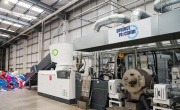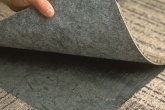Investigation reveals Carpet Recycling UK members sending carpets to incineration
Members of Carpet Recycling UK (CRUK), a trade association set up to encourage carpet recycling, oversees the incineration of almost 130,000 tonnes of carpet annually, according to a new investigation from Changing Markets, Zero Waste Europe (ZWE) and the UK Without Incineration Network (UKWIN).

CRUK, which works with members including John Lewis, Desso and Marlings, claims to promote the sustainability of the carpet industry by diverting carpet waste from landfill.
However, the recent investigation, entitled ‘Smoke and Mirrors’, has revealed that, whilst the association claims to have increased diversion from landfill from two per cent to 44 per cent, almost three-quarters (73 per cent) of this diversion in 2018 took the form of incineration.
Releasing significant carbon emissions, the incineration of carpet waste costs the UK around £16.5 million a year in damage to the climate, according to the report.
The report also revealed that only two per cent of carpet waste in 2018 was truly recycled and used for non-shredded, high-quality products such as carpet underlay and automotive wadding. Although 22 per cent of diverted carpet waste is shredded and used as a surface for outdoor equestrian arenas, this can contaminate the soil and air with hazardous substances, and the carpet cannot be used again once it has been shredded.
A previous Changing Markets survey found that 68 per cent of UK consumers would like to recycle their carpet, but 70 per cent believe that it is the responsibility of carpet producers to facilitate the recycling process. 65 per cent of British people think that the UK Government should take responsibility to ensure that bulky items are recycled.
Rachel Mulrenan from Changing Markets said: “Carpet Recycling UK has been unable to deliver the ambitious, bold and sweeping changes needed within the carpet industry to drive the shift to a circular economy. Instead, the organisation has used its landfill-diversion rates as a smokescreen for what is essentially mass incineration of valuable resources. It is absurd that we are burning carpet during a climate emergency.”
Calling on the government to take action, Mulrenan said: “This clearly shows that the voluntary industry-led approach has failed and that the next UK government should address this wasteful industry with ambitious legislation.
“Only a tiny percentage of carpet waste is truly recycled, which is a huge wasted opportunity. The current system is throwing away or burning billions of pounds of valuable materials, while polluting the environment and negatively impacting on human health. Shifting the carpet industry to a circular economy model is crucial to tackling its hidden waste problem and curbing our carbon emissions in a time of climate crisis.”
Shlomo Dowen, National Coordinator of UKWIN, said: “For widespread carpet recycling to become a reality in the UK, those making new carpets need to redesign their products. Incineration is the opposite of recycling because incineration destroys materials rather than preserving them, and is certainly not environmentally friendly.
“Carpets are made mostly of plastics, which when burnt release harmful greenhouse gases. The climate harm caused by incineration cannot be swept under the carpet. In line with the ‘polluter pays’ principle, it is only fair that those responsible for carpet pollution should be forced to pay for the damage they cause.”
Extended producer responsibility
ZWE has previously called for the European Commission and EU member states to accelerate the carpet sector’s circular economy, publishing a report in 2017 suggesting that an extended producer responsibility (EPR) system for carpets would improve recycling rates.
Commenting on the ‘Smoke and Mirrors’ investigation, Larissa Copello from ZWE said: “As the report shows, voluntary agreements are limited and avoid tackling the heart of the waste crisis by focusing instead on downstream initiatives, such as incineration and downcycling. What is needed in the carpet sector is binding and ambitious policies that tackle the problem at its source by ensuring carpets are designed to be adequately handled at the end of life.
“Extended producer responsibility is a crucial policy tool to ensuring the circularity of carpets as fee modulation within EPR has the potential to encourage producers to better design their products, rewarding toxic-free, reusable and fully recyclable carpets. In fact, a number of major carpet producers in Europe already support mandatory EPR schemes as a way to drive change towards a circular economy.”
Carpet Recycling UK has been approached for comment.
You can read the full report, ‘Smoke and Mirrors’, on the Changing Markets website.







